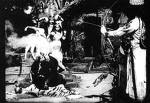 This meeting there was nearly unanimous praise for the novel. All observed with interest that it follows recent trends in cross-cultural literature, by dropping in Hindi and some rarely used British words, the author is making the non-Indian audience work a bit harder to follow his meaning but gaining much in flavor. Anne equated this with Junot Diaz's writing, and Kate P. agreed, having just read Oscar Wao. Maybe this is possible because of ubiquitous internet access as well, (so easy to look words up). This however did not prevent Kate P and Anne from asking Deep, Samian and Sanjay to translate a few words and concepts. The first subject of interest was the mention of several mystical poets, both Hindu and Sufi, and some discussion of connections between Kabir and the Guru Granth Sahib.
This meeting there was nearly unanimous praise for the novel. All observed with interest that it follows recent trends in cross-cultural literature, by dropping in Hindi and some rarely used British words, the author is making the non-Indian audience work a bit harder to follow his meaning but gaining much in flavor. Anne equated this with Junot Diaz's writing, and Kate P. agreed, having just read Oscar Wao. Maybe this is possible because of ubiquitous internet access as well, (so easy to look words up). This however did not prevent Kate P and Anne from asking Deep, Samian and Sanjay to translate a few words and concepts. The first subject of interest was the mention of several mystical poets, both Hindu and Sufi, and some discussion of connections between Kabir and the Guru Granth Sahib. We all enjoyed the very subtle references to class, which made an interesting contrast with Rohinton Mistry, where the subject is more overt and central. The more central theme here seemed to be the subtleties of the relationship between guru and student, the inner lives and workings of the family, and to some extent the greater cultural context of music, classical versus popular. Kate P., Anne, Samian and Deep seened to appreciate Chaudhuri's softness and quietness, the slow movement of his story which is slowly revealed, where Kate B. felt a bit frustrated by the lack of drama in the plot. Anne and Kate P. found themselves astonished by some of Chaudhuri's sentences, which sometimes find themselves starting in one place and ending somewhere else completely. This could make for some slow reading at times; like watching a replay of a figure skater doing a triple axle, or a free style skiier- one has to go back to the beginning to marvel at how it was done. Or to change metaphors- listening to Thelonius Monk- you are sure that a rule was broken, but it was broken so beautifully that it must be listened to thrice to see how it worked. If for nothing else at all, the book seems to want to draw our awareness to the complete world of classical music, in which there were times of day for specific forms, and in which there were reasons for everything, devotion and much internal structure, most visible from the inside.











